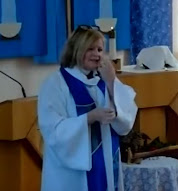Bishop Laurie preached about the liminal time Creator was in both in our calling a pastor and, as a church, navigating our way through the pandemic
The word “liminal” comes from the Latin root, limen, which means “threshold.” This is the “crossing over” space – a space where you have left something behind, yet you are not yet fully in something else. ... One example of this kind of space Bishop Laurie gave was pregnancy, where a woman both is, and is not, a mother.
Bishop Laurie's sermon tied liminal time to the Gospel text as well. She emphasized Creator is currently on two liminal, wilderness journeys with both our pastoral call process and in being church during this pandemic. This is truly a time to hold each other in prayer and recognize the blessings and challenges of this moment in the life of the congregation.
Seeing from the perspective of congregational life gave a special meaning to the second candle lit in Advent, called the Bethlehem Candle. The Gospel lays out another transition - from the powerful to humble as it shifts our gaze from an emperor's rule to a man living in the outskirts of a wilderness. The second candle is lit with the promise that our attention is moving towards Bethlehem, a tiny town resting in Jerusalem’s shadow where the world’s agony was pierced with hope as God drew his first human breath.
As blessed as this time is there is likely to be a loss of focus, a fear and longing to return back to where we before our wilderness journeys. This becomes a stark and central question in Advent. What coming are we looking forward to right now? A return to what it was like before the pandemic or what Creator can become with the knowledge and experience we have gained from this time? The pastor that Creator will call at this time will obviously be part of our response to that question. Bishop Laurie pointedly posed this question for us to think about - what will Creator look like 2030? Crying out to God in the wilderness certainly includes wrestling with deep questions.
Frederick Buechner once wrote, “To be commanded to love God at all, let
alone in the wilderness, is like being commanded to be well when we are
sick, to sing for joy when we are dying of thirst, to run when our legs
are broken. But this is the first and great commandment nonetheless.
Even in the wilderness — especially in the wilderness — you shall love God.”
Creator's Ministry Site Profile was officially presented to the Bishop and the Creator Call Committee was installed in the service. During the installation, I reflected on how this ordinary congregation
in so many ways, continues to
influence my spiritual life. I first posted a blog entry about Creator
in 2006. I knew then what a
special time and a special people made up this ordinary congregation. Together they offered the
right balance of freedom and church tradition I am grateful for. Creator deepened my
understanding of the God that was in my heart.
Certainly the times have changed. The people have changed. I have changed. Yet there is also a continuity. I talk to new members with unique ideas and enthusiasms about the future longevity of the congregation. Members are concerned about Creator's direction and I trust I will learn more about God and how to live in God's world today as a result of the prayers around those directions and concerns.
"The voice of one crying out in the wilderness" in the Gospel reading also brought to mind how central the concept of wilderness became to Pastor Ray's spiritual understanding. In the year prior to the pandemic he would preach about the wilderness and the Promised Land. He firmly believed God comes to us, and works within us, when we are in the wildness.
He preached that the meaning of baptisms in the Jordan River was clear to those who followed John in his time. For them it represented a place of transition from the wilderness to the Promised Land, a transition to new beginnings, After John this became the place where John baptized Jesus. In the Exodus story the seas parted for God's people to be free from bondage. Even though the partings happened in different places, for Jesus, God parted the heavens rather than the water.
At first this geography was troublesome for me. The Exodus story dramatizes the movement of God's people from bondage, to the wilderness, and finally to the Promised Land. Where were the people moving when John baptized them? They were coming from the same land that was promised by God in Exodus. So why would the people transition back to wilderness. This prompted another question. Why would knowing what the Jordan River meant to the ancients make baptisms meaningful in our lives?
Now, because of a renewed focus on transition, I think I know an answer. John's baptisms signified a
transition to a new Promised Land. This emphasizes God's promise does not simply revolve around a
plot of land in this world. Christians are baptized in spirit and in a holiness
that can exist beyond place, beyond ownership.
Lastly, today's First Reading: Malachi 3:1-4 powerfully connected with last week's "End of the Age" meditation that mixed the fear and hope we have of end times. with verse 2 and 3 " But who can endure the day of his coming, and who can stand when he appears? For he is like a refiner’s fire and like fullers’ soap; 3he will sit as a refiner and purifier of silver, and he will purify the descendants of Levi and refine them like gold and silver, until they present offerings to the LORD in righteousness.





No comments:
Post a Comment